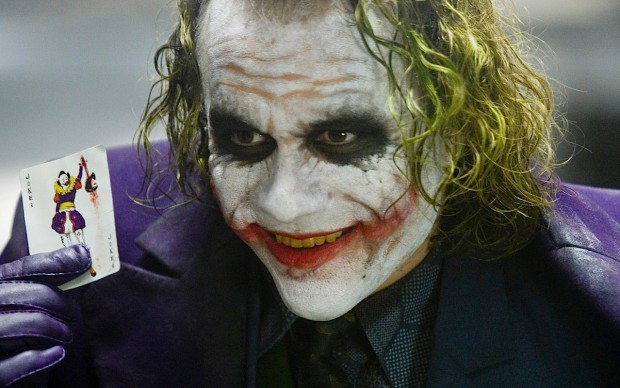It’s movie villain time once again boys and girls and this time I’ve decided to… be rather unadventurous and go with another DC movie villain; specifically, Heath Ledger’s Joker from The Dark Knight.
Now I realise that I’m not exactly searching far afield, but if we’re going to delve into the psychology of villains, DC’s iconic madman has to be looked at eventually. However, there is a world of difference between Joker’s two movie portrayals thus far. Jack Nicolson’s Joker was a gangster; an organised crime boss. He might cause massive death and destruction, but he still had his gang; he still had his plan.
But, as we all know, Ledger’s Joker doesn’t like plans. Or so he claims; his actions aren’t entirely consistent with the philosophy he preaches. You see, what makes Ledger’s Joker interesting is that he is not the open book he likes to present himself as. This is why I’m picking him over Nicolson’s Joker; Ledger’s Joker has more bubbling under the surface.
So let’s dig in.
If there’s one thing that Joker and Zod have in common, it’s the same quirk that turns many characters into villains; what they believe and how they act contradict each other. Zod believed his choices were the best options for Krypton’s survival/rebirth, when they only made things worse. Joker, meanwhile, calls himself an anarchist; he declares himself in opposition to people’s plans to try and control life. He scoffs at Dent’s suggestion that he has any kind of plan.
Except, well, he kind of does; to the point where he’s better at long term strategic planning than Batman is. Let’s go over Joker’s actions throughout the film as he takes Gotham from slow stabilisation to the point of uncontrolled chaos.
The film opens with an extremely detailed example of the Joker’s focused, strategic brilliance. The heist against the mob bank is perfectly researched and executed, which is telling in and of itself. The definition of insanity is supposed to be repeating an action and expecting a different result. That means that an insane person is disconnected from reality to a certain degree. That’s clearly not the case here; even when things don’t go to plan, the mobster with the shotgun or the henchman who wises up to his kill the others policy, he adapts perfectly. Even if it’s as simple a tactic as taking a few steps to the side so that the henchman has to step into the path of the approaching buses to keep him at gun point.
He also takes advantage of Batman and Gordon focusing on the mob in two different ways. Batman’s ‘he can wait’ attitude allows him to act almost unhindered in the early stages of the film. At the same time, he tracks down the mob meeting and offers his services to deal with Batman while they still think they’re untouchable. Then, when they realise that they’re not, they realise that he was ‘right’ and end up placing far more trust in him than they should.
Now you could argue that this was all just a lucky coincidence, but I’d say no for several reasons. Firstly, it all works out far too well for the Joker; by the time Batman and the police realise what a threat he is, he has the entire mob behind him. Secondly, the speed with which he sets himself up as the guy going after Batman suggests that this was his intention all along. Thirdly, while he makes a big show of burning all that money later in the film, that might be because he already has all the money he needs from knocking off multiple mob banks and not having to split the money afterwards. It smacks of long term planning and the fact that he counts on the mob continuing to lose ground makes it clear he’s done his homework on Batman as well.
To avoid repeating myself, I’ll just emphasise it here; the strongest evidence for Joker’s ‘anti plan’ stance being nonsense is how easily he gets things done. Now Gotham is corrupt, there’s no doubt about that, but Loeb and that judge only died when the Joker turned his attention to them. This is in spite of the many people who would love to go after them. Loeb, in particular, is a telling example. Loeb only dies because the Joker knows his habits (keeps booze in his drawer for extreme situations) and his mentality (doesn’t take Gordon’s warning seriously enough to be wary about taking a drink). Joker’s plan to get captured only worked because Gordon was still alive; the surviving cops were predictably running scared in the face of the mass carnage he’d unleashed, so he needed a cop he could count on to stay cool. So he understands how Gordon thinks and realised that his death was likely faked.
I could go on, but the sheer volume of examples of the Joker’s strategic and operational genius is rapidly bloating the word count of this article.
So instead, let’s turn our attention to why he does what he does. Is he not really an agent of chaos as he claims? Well, yes and no; Joker thinks he’s an agent of chaos in the same way some people think freedom of speech means freedom from criticism.
What Joker means when he says chaos is ‘freedom to do whatever I want’. His objection to ‘plans’ is less an ideological one and more a dislike of how other people’s structures and plans restrict him. When given the choice of what to do, he comes up with elaborate plans that cause absolute chaos. His efforts to prove that anyone else would turn against society’s rules when pushed are his attempt to justify who he is. It’s certainly not some visionary attempt to destroy society’s shackles because Joker, and the lifestyle he loves, can only exist when everyone else follows the rules.
No, what makes Ledger’s Joker so memorable is the deeply human trait at the core of his, otherwise warped, character. He desperately seeks to justify the existence of a person like himself; a person’s identity is their very existence. It’s why people tend to be so reluctant to change things about themselves.
It’s also why he is so obsessed over Batman, as well as why he is so delighted when Batman proves incorruptible. To Joker, Batman is a paragon of everything he wants to be and to have. Like him, Batman does what he wants, when he wants, in spite of the best efforts to stop him. Except, Batman has done one better than the Joker; not only can the law not stop him, they eventually side with him. That, to Joker, is the Holy Grail; to be able to do what he wants without risking the destruction of the society he depends on.
That’s why he laughed when he thought Batman had decided to kill him and also laughed when Batman saved him. If Batman had killed him, he would have died with the satisfaction that he’d been able to get his way. But Batman saved him showing, in his eyes, that Batman was determined to get his way no matter what. So his idol remains unsullied. This, for the Joker, is the best possible outcome; his idol lives up to his expectations and Joker thinks he’s still going to get his way (thanks to Harvey’s rampage).
Next time, I promise, I’ll do a non-DC villain.



















No Comments